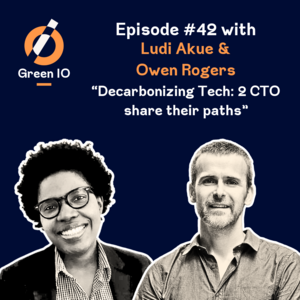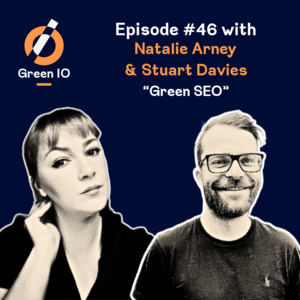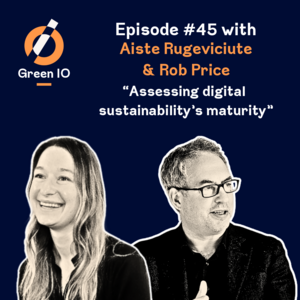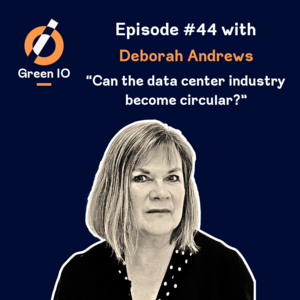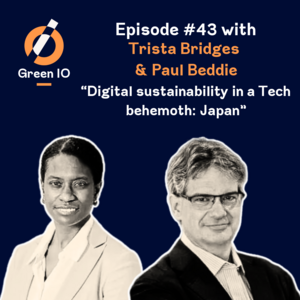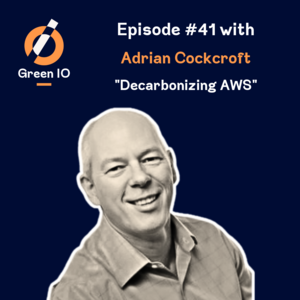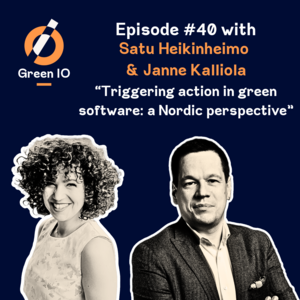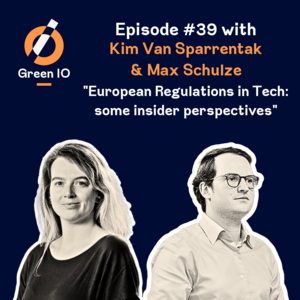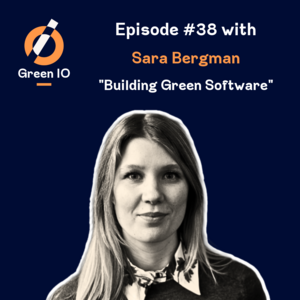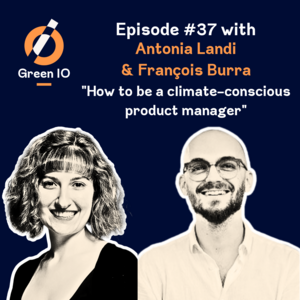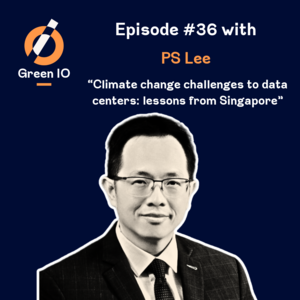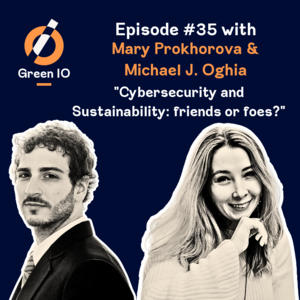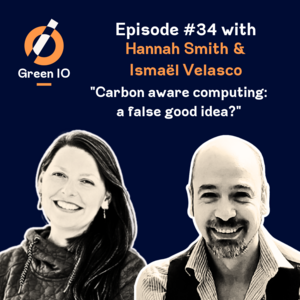#42 - Decarbonizing Tech: 2 CTO share their paths with Ludi Akue and Owen Rogers
Update: 2024-07-02
Description
💭Decarbonizing tech stacks and platforms? This is the challenge many CTO face these days.
🎙️In our 42th episode, 2 CTOs with different backgrounds and operating in different lines of business cross share their experience in reducing the environmental footprint of their operations. Ludi Akue, former Lunii’s CTO, and Owen Rogers, .eco’s CTO meet Gael Duez to share their insights and reflect on each other journeys in sustainability.
Some Takeaways:
🌐 pro and con of migrating infrastructure to a lower carbon region,
⚙️ how to leverage technical debt to boost decarbonization,
💰 when does optimization pay for decarbonization,
⚠️ the pitfall of creating a separate program to steer sustainability,
and much more!
❤️ Subscribe, follow, like, ... stay connected the way you want to never miss our episode, every two Tuesday!
📧 Once a month, you get carefully curated news on digital sustainability packed with exclusive Green IO contents, subscribe to the Green IO newsletter here.
📣 Green IO London is on September 19th 2024 --> use the voucher GREENIOVIP to get a free ticket!
📣 Green IO London is on September 19th 2024 --> use the voucher GREENIOVIP to get a free ticket!
Learn more about our guest and connect:
📧 You can also send us an email at contact@greenio.com to share your feedback and suggest future guests or topics.
Ludi and Owen's sources and other references mentioned in this episode:
- Putting our websites on a low carbon diet
- Lunii
- .eco
- Carbo
- Sustainable Development Goals
- UN Global Compact
- Not the End of the World
- Lucie 26000
Transcript
Intro 00:00
With regard to organizations prioritizing sustainability goals, a big part of that, in my opinion, is ensuring that those goals are publicly stated so that there is an element of accountability around that.
Gael Duez 00:24
Hello everyone, welcome to Green IO with Gael Duez - that’s me! - Green IO is the podcast for responsible technologists building a greener digital world, one byte at a time. Twice a month on a Tuesday, our guests from across the globe share insights, tools, and alternative approaches, enabling people within the Tech sector and beyond, to boost Digital Sustainability.
And because accessible and transparent information is in the DNA of Green IO, all the references mentioned in this episode, as well as the transcript, will be in the show notes. You can find these notes on your favorite podcast platform, and, of course, on our website greenio.tech.
Decarbonizing a tech stack, or a platform, or a full information system. This is the challenge many CTO face these days. And beyond carbon, more environmental indicators are taken into consideration. Far from being just a few technical choices to make, it often implies multiple decisions at multiple levels with multiple stakeholders to succeed. Hence, this episode where I wanted CTOs to share and exchange about the strategy they choose to achieve the sustainability goals their company committed to. 2 CTO with different backgrounds and operating in different lines of business are welcome today. Ludi was CTO at Lunii for three years, a highly successful toy maker in France, and she's now digital CTO at Bpifrance. But she's also part of a vibrant community, tech.rocks which gathers French CTO in Paris and beyond. Owen is CTO at Dot ECo, a company operating the registry ECO and has successfully run decarbonization of its tech stack. And he's also part of the climate action tech community. And this is where I've had the pleasure to meet him. Ludi Owen, thanks a lot for joining Green IO today. It's a pleasure to have both of you in different time zones making the effort to be in the show at the very same time. So thanks a lot and welcome to the show.
Ludi Akue 02:41
Happy to be here. Thanks for the invitation, Gael.
Owen Rogers 02:44
Thanks for the intro, Gael.
Gael Duez 02:48
So without further notice, I would like to ask both of you the same question, and it's a highly complicated one. What was the impact, or in another word, what were the goals you were aiming to achieve when you started to reduce the environmental footprint of your technical operations or your tech stack? Maybe, Ludi, you want to start?
Ludi Akue 03:16
Yeah. Thank you for the question. So the goal was pretty big. It was, we need to change the way we produce everything. So it's a big, hairy goal. Not clear at all. That was the goal I had in the beginning, knowing that the company Lunii was a toy maker. So as you said, a hardware toy maker. And I managed both the hardware teams and the software teams. So the challenge was just clear. Very clear that we need to change things. We need to be impactful, but we don't have a clue about the KPI's to get there.
Gael Duez 03:59
It was kind of top down. It was like a big strategic enterprise goal and in a very sort of OKR approach, like we've got something very ambitious to achieve, I guess not in a single year. Make something with it. Am I correct here?
Ludi Akue 04:19
Yeah, I think it's much more subtle than that. There were some key results, let's say more on the supply and the manufacturing side. The first model of the toy was made in China and brought back the manufacturing to France. For example, you have big goals but after those goals, when coming to the tech stack, everything about the tech operations, architecture, there was a blank page. Like, I needed to build a plan with my teams, of course, to measure and to reach the goal of changing, be more responsible.
Gael Duez 05:05
I guess this is a moment where I have to admit that, a) my daughter has bot histoire, b) actually, I know this because the one my daughter has has been made in France on top of it, but the one my nephew has, which is one year older as still made in China. So I was like, oh, my God, they made it. Congratulations.
Ludi Akue 05:31
But, yeah, I just want to add something very quick. I was really impressed by the vision of the founders. It's like they wanted to change things as they are growing a growing company. They now have a working business model. I can share some figures. At that time, there were about more than half a million customers, more than a million of toys sold all over the world, in France, in Europe, North America. So they had this strategic vision to say, we need to measure and change our impact. I was really impressed by that.
Gael Duez 06:15
And what about you, Owen? What were the goals when you started this sustainably journey at .eco?
Owen Rogers 06:23
So I would say for us it was pretty different in as much as it was more bottom up instead of top down. And we are purely virtual. We just deal with digital products, so there's nothing physical for us to have to worry about optimizing. So my job, I think, was probably significantly easier than Ludi's in that regard. So for us, we operate the .eco top level domain in partnership with the global environmental community in the face of increasingly dire climate effects that we are seeing in the world around us. We were feeling like there had to be something more that we could do some way that we could have an impact ourselves. But it wasn't totally clear how we could do that. Being a company that focuses strictly on digital products, we started to learn about the climate effects of technology and realizing that there was in fact, a lot that we could start to do to reduce our impact. So we wanted to understand what was our carbon footprint. None of us had any expertise in doing carbon life cycle analysis and carbon footprint calculations. So we went and spoke to a number of auditors that will evaluate the carbon footprint of organizations. And the response that we got for most of them was, we're super busy right now, and perhaps there's some work that you can do on your own in order to understand your own footprint, compile the data, and then perhaps we can come and assist you later. So we started to do that ourselves. We started to work with our vendors, with our partners, and pull together whatever data we could to understand our own carbon footprint and realize pretty quickly that this is not complicated. Doing basic carbon calculations is not a hard thing. It's certainly something that you're doing some pretty rudimentary mathematics, and it's something that most software engineers should have no trouble with. And so that enabled us to calculate the carbon footprint of our company, and that s
Comments
Top Podcasts
The Best New Comedy Podcast Right Now – June 2024The Best News Podcast Right Now – June 2024The Best New Business Podcast Right Now – June 2024The Best New Sports Podcast Right Now – June 2024The Best New True Crime Podcast Right Now – June 2024The Best New Joe Rogan Experience Podcast Right Now – June 20The Best New Dan Bongino Show Podcast Right Now – June 20The Best New Mark Levin Podcast – June 2024
In Channel

